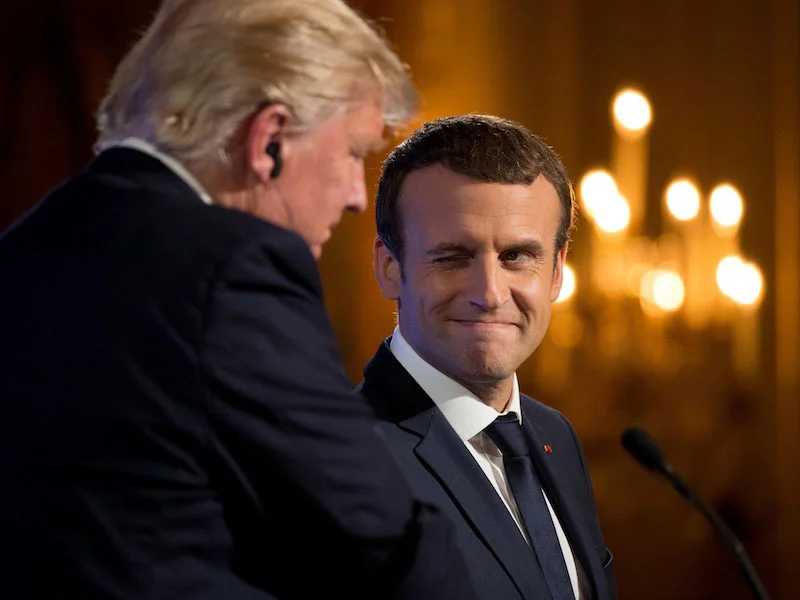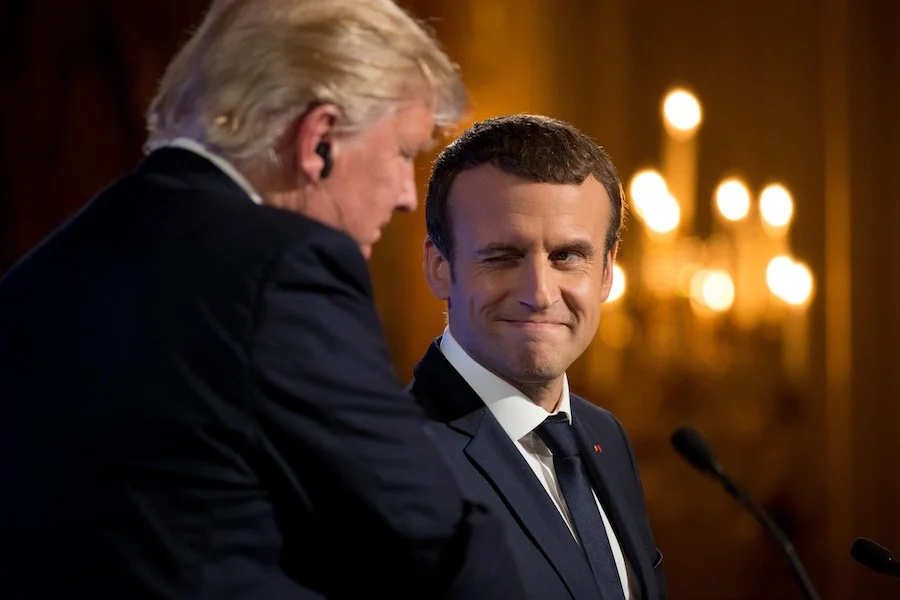From abroad - Trump & Macron: It’s A Match
Underneath it all, both presidents have more common ground than you might think – and it could be a good thing for France and the United States alike.
“He loves holding my hand,” said President Trump about President Macron after his meet with him for Bastille Day celebrations in Paris. The POTUS’s visit to France, then, went extraordinarily well, save for a couple of “No-Trump zone” graffiti tagged on a couple of walls just out of reach of the 11,000-strong police force securing the event.
Of course, formal visits are rarely contentious. France has to keep up the facade of diplomatic friendship, you say – President Trump is, no matter what bone we have to pick with him, President of the United States. But in the past months, both men agreed to disagree on virtually every conceivable topic, and kept on sparring verbally. “Pittsburgh, not Paris,” quipped Trump as he pulled his country out of the Paris Climate Accord. “Make our planet great again,” snapped back Macron.
But their disagreements run deeper than politics. Everywhere you look, they are, indeed, almost perfect polar opposites. Macron has no children; Trump has four. Macron's wife is 25 years older than he is; Trump's wife is 25 years younger. Trump is the oldest US president to enter office; Macron is France's youngest leader since Napoleon Bonaparte.
It’s hard to expect harmony between them, when Trump praised the hard-right candidate Marine Le Pen as the “strongest candidate” during France’s presidential contest. Macron himself has been endorsed by Barack Obama, Trump's predecessor and vocal critic. It thus wasn’t all roses when the freshly elected presidents met face-to-face for the first time last May, during a NATO meeting in Brussels. As they shook hands and no one would budge, knuckles whitening, the press covered it like a new Rocky sequel. “Crunched bones,” said The Guardian. “Steely grip,” said The Huffington Post. “Jaw clenching,” said Reuters.
Their ascension to power
Disregard the macho posturing both men used on each other as they weighed each other up. Though Trump and Macron have dissimilar ideas about how the world should be run, there are some striking parallels about them, not the least of which is their rise in politics.
Olivier Piton agrees. Currently a lawyer based in Washington, D.C., he wrote a book, The New American Revolution, about America’s deeply unconventional presidential campaign of 2016. He thinks they are mavericks, each in his own way:
What brings Trump and Macron together is that they’re both outsiders. No one would’ve bet on Trump in 2015, and certainly no one would’ve seen Macron becoming president when he created his party a year ago.
Never before in the United States has a man that was neither a politician nor holding a military position been elected to the most powerful office in the world. Macron is no different. “His path is unique ever since the French Republic was founded,” Piton says. He is sometimes compared to Giscard, who was president of France from 1974 to 1981, and portrayed himself as a less formal, more approachable, younger president than the leaders of yesteryear. But “Giscard was anything but a newbie” – he was first a député, then a ministre over the span of 15 years before he was elected president.
Their rhetoric
The way Trump and Macron address their electorate, too, has similarities. Macron has been praised as a cultured man who quotes poetry and recites Molière. He’s good at using Aristotelian rhetoric to convince his audience. Piton says that Trump does the same – even when he tweets.
Dissecting Trump’s Tweets
The Aristotelian rhetoric uses the following three-part formula:
1. Logos – stating a fact.
2. Ethos – consolidating and cementing that fact.
3. Pathos – this is where the emotion turns the tweet into a cannonball.
Have a crack at applying the Aristotelian formula to Trump’s tweets:
My son Donald did a good job last night. He was open, transparent and innocent. This is the greatest Witch Hunt in political history. Sad!
— Donald J. Trump (@realDonaldTrump) 12 juillet 2017
A new radical Islamic terrorist has just attacked in Louvre Museum in Paris. Tourists were locked down. France on edge again. GET SMART U.S.
— Donald J. Trump (@realDonaldTrump) 3 février 2017
Mexico was just ranked the second deadliest country in the world, after only Syria. Drug trade is largely the cause. We will BUILD THE WALL!
— Donald J. Trump (@realDonaldTrump) 22 juin 2017
Trump uses pathos in massive doses, oft-times in a gaudy, spontaneous manner, “through wake-up calls and wishes for a complete overhaul of policies.” Macron does, too, more positively – promising success for France and better tomorrows, through the power of optimism, using that very word during his presidential victory speech: “I want us to bring back optimism, for us to regain our winning spirit,” he tells the French.
Their policies
Winning is a Trumpian obsession. By wanting to “make America great again,” Trump’s promise is a passé form of optimism. “Trump’s policies are more traditional than they seem,” Piton says, “in that they are a return to form to American politics before their upheaval in the 1960s”. Macron’s policies are far from revolutionary as well, and have a feeling of déjà-vu: “a policy of strong ties with Germany, fiscal orthodoxy and no laissez-faire when it comes to immigration.”
This return to form is a paradox, seeing how both leaders rode the wave of change, or, more accurately, dégagisme, a neologism that translates as “a popular urge to hurl out any leader tainted by elected office, establishment politics or insider privilege”, as explained by Tom Nuttall, Charlemagne columnist for The Economist.
Both leaders were elected amid growing worries in both countries about jobs, immigration – as Europe is seeing the largest migration of refugees since World War II, the United States fearing a spillover – and the ever-looming threat of terrorism. But the crux of the election was globalization. “America’s worst nightmare is no longer being number one. France’s worst fears stem from the European Union.” Both candidates assuaged their peoples’ worries about the drawbacks of globalization. Trump’s “America first” isolationist policy was a promise of a cure-all for America’s globalization woes; Macron’s vision of Europe convinced the French that the European Union is the best protection they have, however unsatisfactory, against globalization.
Their goals
But what decisively unites both men is that, on a substantive level, they have few topics of discord. The United States is in dire need of a key ally in Europe. The United Kingdom and Germany have played that role in the past. But the British, as trouble brews over stalled Brexit talks, are poised to lose quite a bit of influence and relevancy in Europe. The Germans have decided not to take the high road with America’s new president; moral intransigence is Angela Merkel’s policy, who says Germany can rely on Trump’s United States no more.
That leaves France, and France only, as America’s reliable European ally, “for the first time in two hundred years,” says Piton. It was not so, fifty years ago, when De Gaulle pulled France out of NATO. It was not so, fifteen years ago, when the United States invaded Iraq. Now, both countries are on the same wavelength when it comes to military policy, especially terrorism-busting operations in Syria and in West Africa.
However controversial, Trump’s policies will have few, if any, deleterious effects in France. Macron, who worked in the banking industry, speaks English fluently and knows how to close deals with Americans. But he intelligently plays to his people by not appearing too close to Trump. His predecessor, Nicolas Sarkozy, in sharp contrast from past policy, extended every courtesy to George W. Bush; some even said he cozied up to him, which earned him in France the derisive nickname “Sarko l’Américain”. Macron wants to appear strong; an ally on equal ground. Yes, a Pew poll, released in June, shows that only 14 percent of the French believe Trump will do the right thing regarding world affairs. Barack Obama scored 84 percent. But Donald Trump might end up being a better – however implausible – ally of France than Barack Obama ever was, and someone well-suited to work with the newly elected president of France.





